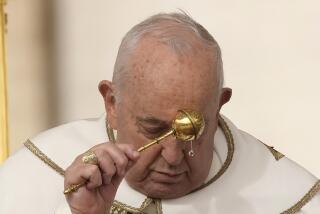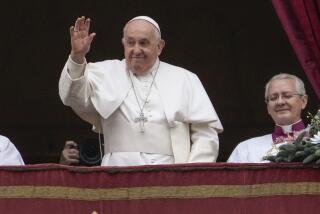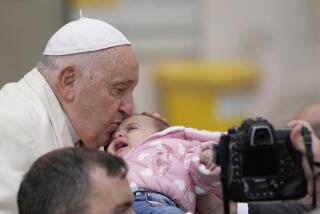Pope Calls for End to Sectarian Violence
CAIRO — Pope John Paul II, arriving here for a pilgrimage to Mt. Sinai, appealed Thursday to Egyptians to reject sectarian violence and live up to their nation’s ancient ideal as a tolerant meeting ground for people of all faiths.
The Roman Catholic leader and Egypt’s highest Islamic authority later had a groundbreaking encounter and voiced agreement on the centrality of religion in human fulfillment. They vowed to meet again in the Vatican later this year.
John Paul’s visit, the first to Egypt by a modern pope, comes on the heels of the country’s bloodiest outbreak of fighting in three decades between members of its Muslim majority and its beleaguered Christian minority.
“To promote violence and conflict in the name of religion is a terrible contradiction and a great offense against God,” the pope said during a nationally televised arrival ceremony at Cairo’s airport. “But past and present history give us many examples of such a misuse of religion.”
He urged Egypt’s religious and political leaders to offer “a great sign of hope for the peoples of the world” by championing inter-religious dialogue and “respect for the rights of all.”
President Hosni Mubarak welcomed his 79-year-old guest with a warm handshake and an assurance that Egypt “prides itself as a safe haven for all messengers of God.”
“Today the Egyptian people stand together, united by their submission to the will of God and inspired by the spirit of both Christianity and Islam,” Mubarak said. “We should strive together to fight fanaticism, prejudice and hatred.”
Neither man mentioned the hostility that erupted at the new year, when three days of clashes between Muslims and Coptic Orthodox Christians in El Kusheh, a remote village in upper Egypt, left one Muslim and 20 Christians dead. The killings deeply embarrassed Egyptian authorities.
Egypt’s Christian community, made up mostly of Copts--who number about 10% of the population--is the largest in the Middle East and a key to determining whether Christians remain in any meaningful numbers in a region where Islam is the dominant creed.
In Old Cairo, where narrow lanes wend through a maze of churches, shrines and other holy sites as old as any in the Christian world, there was no sign Thursday that last month’s violence had set off panic in the Coptic community as a whole. Instead, there was talk that the visit of the “Vatican baba” would help show that bonds between Egypt’s Christians and Muslims are fraternal.
“We are one” with the Christians, said Esmail Ali Dessouki, a perfume merchant. “We eat together from the same plate. If [there is] peace, we make money here. If no peace, no money.”
A group of four young female archeology students visiting Old Cairo to observe restoration work stopped to discuss the papal visit. Three were Muslim and wore scarves to cover their hair in keeping with Koranic admonition. The fourth was a Christian, Hanna Shawi, 19, who wore no scarf.
All four were at pains to explain that the head covering was the only real difference between them. “There are some problems, sometimes, but they pass,” Shawi said.
In fact, discrimination is evident in Egypt, where Islam is the state-supported religion. Copts have difficulty getting permits to build new churches and complain that their religion and history get short shrift on television and in school curricula. Not one provincial governor is a Christian.
Although they aren’t Catholics, the Copts hope that John Paul’s visit will help them.
Bells pealed at the Coptic cathedral as hundreds welcomed John Paul to a meeting with their patriarch, Pope Shenouda III. One banner read, “The churches of Egypt rejoice in the new meeting of Peter and Mark,” patron saints of the two denominations.
“I consider Egypt a holy land,” John Paul said after moving slowly through a crowd of well-wishers at the patriarch’s residence as four children spread flowers in his path. “I feel at home here.”
Later, John Paul paid a visit to Mohammed Sayed Tantawi, grand sheik of the millennium-old Al Azhar University, the most influential teaching institution not only in Egypt but the entire Sunni Muslim world. It was their first meeting, and it elevated a dialogue that has been going on between theologians from the Vatican and the university for nearly 20 years.
Tantawi briefed reporters on their common ground: All humanity descends from one man and one woman; religion is “a gift” that helps people fulfill themselves and be happy; religion is fundamental to the future of the world.
Nodding in agreement, the pope added: “Islam is a religion and a culture. Christianity is a religion and a culture. The future of the world will depend on the dialogue between different religions and cultures.”
This 90th foreign journey of John Paul’s 21-year-old papacy is the start of a two-part pilgrimage retracing events described in the Bible. On Saturday, he will pray on Mt. Sinai, where the Bible says Moses received the Ten Commandments. Next month he will visit holy sites in Israel and the Palestinian-controlled territories.
With the pilgrimages drawing the Vatican deeper into Middle Eastern politics, the pope voiced support Thursday for Mubarak’s record on promoting peace between Arabs and Israelis.
“All reasonable men and women appreciate the efforts made so far, and hope that goodwill and justice will prevail, so that all peoples of this unique area of the world will see their rights respected and their legitimate aspirations fulfilled,” he said.
More to Read
Sign up for Essential California
The most important California stories and recommendations in your inbox every morning.
You may occasionally receive promotional content from the Los Angeles Times.









